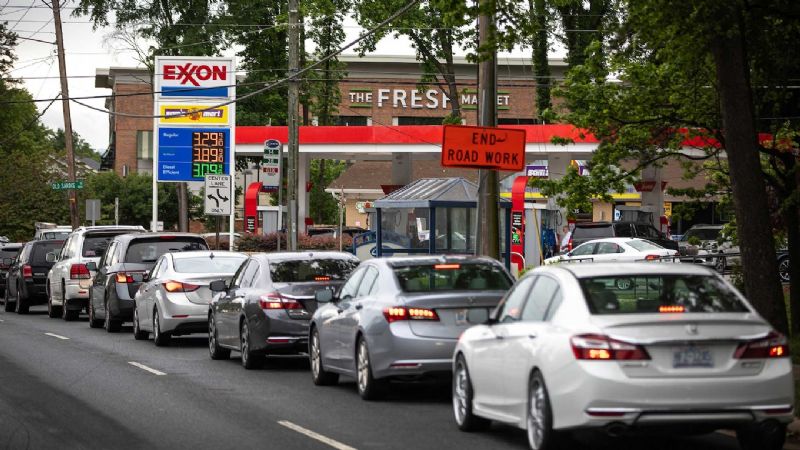The Colonial Pipeline Shutdown Is Over, So Why Is Everyone Panicking?

If you live along the Eastern seaboard of the United States, you're probably thinking about gas today, and not the kind generated by that weird burrito you ate for lunch. We're talking gasoline, and the panic gripping drivers in the aftermath of the Colonial gas pipeline, which runs from Texas to New Jersey, being hacked and subsequently going offline over the weekend. Thing is, just because the key pipeline was shut down following a cyberattack, there isn't any reason to panic if you live in any of the states the pipeline services. As of Wednesday, May 12, Colonial Pipeline says it has begun restoring service, a process that will take a few days to fully complete. We just got off the phone with #ColonialPipeline CEO. They are restarting pipeline operations today at ~5pm. More soon. — Secretary Jennifer Granholm (@SecGranholm) May 12, 2021 Everything Was OkayUntil Panic Set In Well, there wasn't any reason to panic before people started panickinga collective paranoia that's led to runs on gasoline in a number of states in the Southeast. That's because the 5,500-mile pipeline is just one delivery method for gasoline for those areas, and guess what? Those states also have roads and many have ports, both of which support the delivery of gasoline by other means (ship, tanker truck, and so on); the pipeline only handles about 45 percent of fuel deliveries for the East Coast, per NPR . Even if the pipeline were to stay offline for an extended period of time, state governments (and likely the federal government) would step in and marshal resources so that pumps keep flowing. What was expected to be a minor blip in the supply chain has thus turned into a goofball situation. Officials had expected the on-the-ground gas supply to be fairly stable following the pipeline shutdown, and indeed, in the days immediately following the cyberattack, gas prices nationwide, as well as in affected states, held firm. Then, it seems, folks started panicking, forming huge lines outside of gas stations and, predictably, running those pumps dry and driving up prices. The Atlanta Journal-Constitution even reports that someone drilled holes in a parked U-Haul truck to steal a few gallons of gas, leaving behind an incredible mess. Frustrated officials are now frantically trying to assuage citizens' concerns while also trying to bring a halt to the run on gas. The panic is what's causing the problem more so than the original pipeline issue. Here's why: Remember when it wasnt a good idea to panic buy toilet paper last year? Please dont do it with gas now. This can create spot shortages at stations, which is what we DONT want to happen. Colonial Pipeline hopes to resume normal operations soon. pic.twitter.com/BeEo1ShKmi — Virginia Department of Emergency Management (@VDEM) May 12, 2021 The Supply Chain Didn't Exactly Break If people think something is running out (as we saw early in the pandemic with toilet paper and the like), then it's tough to pivot their thinking back to rationality. The Colonial pipeline operators believe the gas will begin flowing again later this week; in any event, stations that have run out of fuel may be refilled even before then and some may already have been. That's because overall fuel inventory and reserves aren't drydemand has simply spiked to a level where stations are running out of gas before getting refilled from area reserves and storage. As the tweet above from Virginia's Department of Emergency Management above shows, what most people are seeing are spot shortages, not shortages along the entire supply chain. According to The New York Times , the Colonial Pipeline operators have even opened up sections of the artery to relieve some supply pressures in a few states, including Maryland and New Jersey. Point is, when an abnormal number of people decide to fill up every container and vehicle they own at once, it stresses the end of the supply chain; in many places, it's expected that relief will come with the next regular final-mile shipment of fuel, which, as you probably guessed, doesn't spurt forth directly from the Colonial Pipeline and into gas pumps. It's shipped from the pipeline. A statement from the company on Monday, May 10, noted how it had tapped fuel stores along its pipeline to deliver to end-use customers. In a statement Tuesday, May 11, Colonial Pipeline noted how it has delivered approximately 967,000 barrels (about 41 million gallons) to various delivery points along [its] system since the pipeline shut down. Roughly 84 million gallons of fuel have been teed up for transport as soon as the pipeline is fully functional again so that supply and the tapped storage will quickly be restored. All of this is to say that even during the shutdown, a non-zero amount of fuel continued to floweither taken out of the pipeline itself, or transported other waysto key markets along the route, including Atlanta, Georgia; Belton and Spartanburg, South Carolina; Greensboro, North Carolina; Baltimore, Maryland; and Woodbury and Linden, New Jersey, per Colonial. On a normal day, with the pipeline running, Colonial can move 1.5 million barrels of gasoline , so supply is down but not completely outprecisely why folks should not grab every container and vehicle they have capable of holding fuel and fill them up at the same time, which can exaggerate any impact from the pipeline issue. Don't do what these folks are doing: Filling up beyond what they need. Panic Is as Panic Does All of this logic isn't changing anything on the ground in Georgia, Alabama, Tennessee, and other states. According to GasBuddy.com , as of Wednesday afternoon, some states were seeing double-digit percentages of gas stations completely out of fuel. On the flip side, the data shows a lot of the panic is overblown. While Georgia (43% out of gas), South Carolina (43% out of gas), North Carolina (65% out of gas), and Virginia (44% out of gas) are definitely in it now, with deeper outages in more populated areas, most affected states are seeing single-digit percentages of total gas outages statewide. The figures don't break down whether the outages shifted around to different stations, maintaining or slightly growing the total number of outages, or if simply more stations ran out of fuel; the data also only began flowing today, though throughout the day the percentages didn't change much, if at all. Today I signed an executive order suspending the gas tax in Georgia to help with higher prices as a result of the Colonial cyber attack. We are working closely with Colonial and expect for them to recover by the end of the week. pic.twitter.com/evGLqwHs2X — Governor Brian P. Kemp (@GovKemp) May 11, 2021 Our advice is this: If you live in an affected area, don't go get gas for the sake of getting gas. Keep what's in your tank and perhaps limit extraneous travel, filling up normallyas in, when you need to. Then go and tell your friends and loved ones the same thing. Limiting panic-buying of fuel will ensure there's enough for those who need it, and will give the supply chain time to restock stations. Provided you can hang on, and panic buying subsides, the gas shortage of 2021 will cease to be an issue in a matter of days. Some states are suspending gas taxes (Georgia, above, and Florida) in a bid to offset price increases. It was never supposed to be much of an issue in the first place, and the mania surrounding the pipeline's end product is distracting from the very real issue of pipeline cybersecurity. The Colonial Pipeline won't be the last American fuel distribution network to be hit by hackers, so policymakers and private companies need to take seriously the security of their systems to ensure a similar temporary halt to the distribution of fuel doesn't snowball into another needless panic. --> The post The Colonial Pipeline Shutdown Is Over, So Why Is Everyone Panicking? appeared first on MotorTrend .
http://www.motortrend.com/news/colonial-pipeline-gas-shortage/





